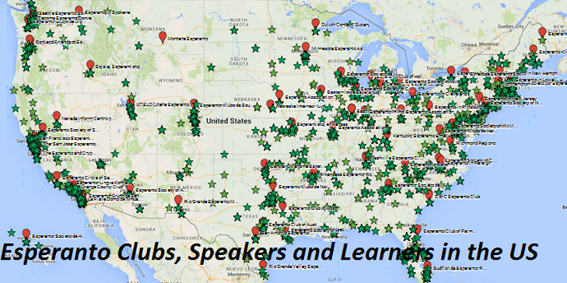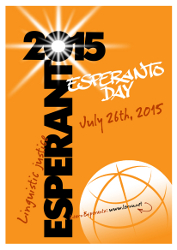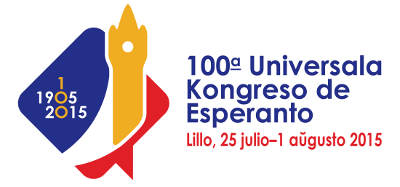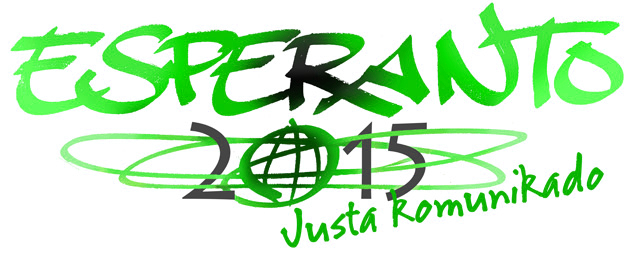By Mar Cárdenas Loutzenhiser and Stefano Keller
July 5th, 2015

More than 40 people from the US have signed up so far to participate in the 100th World Esperanto Congress, from July 25 to August 1, 2015 in Lille, France. More than 2,500 people will be there, from 82 countries, but our US friends will not need interpreters to debate the convention's theme "Languages, Art and Values in Intercultural Dialogue"
In this event everyone will speak in Esperanto, the international language, and so the huge number of meetings, presentations, debates, and artistic presentations will take place without communication barriers, no one will be excluded because of language issues.
Every year this event takes place in a different country and often in another continent. This year's hosting city, Lille, is near Boulogne-sur-Mer, where the first international gathering of Esperanto-speakers took place in 1905. Our US friends will visit this historic site in the Esperanto movement during one of the field trips organized for the participants.
 The first Esperanto book was published in 1887, by Ludoviko Lazaro Zamenhof, in Bialystok (part of Poland now), precisely with the intention of making communication easier, allowing understanding between speakers of diverse languages, based on linguistic justice. This interethnic language is widely used today in all fields of cultural, scientific and social life, in contacts between people of many countries, from all over the world. It is the only one who makes it possible to have just communication with mutual respect among people, enables equal communication opportunities to the users, not being a native language, specific to a certain ethnic group. Using Esperanto, the linguistic rights of all speakers are respected, minorities, indigenous peoples, people of different ethnicities do not have to submit to the use of the mother tongue of the stranger.
The first Esperanto book was published in 1887, by Ludoviko Lazaro Zamenhof, in Bialystok (part of Poland now), precisely with the intention of making communication easier, allowing understanding between speakers of diverse languages, based on linguistic justice. This interethnic language is widely used today in all fields of cultural, scientific and social life, in contacts between people of many countries, from all over the world. It is the only one who makes it possible to have just communication with mutual respect among people, enables equal communication opportunities to the users, not being a native language, specific to a certain ethnic group. Using Esperanto, the linguistic rights of all speakers are respected, minorities, indigenous peoples, people of different ethnicities do not have to submit to the use of the mother tongue of the stranger.
Today's technical tools quickened the spread and use of Esperanto in the world. The Internet, the various computer, mobile phone options, online courses significantly contributed to the increase in the number of English-speakers, their contacts, meetings. In addition to many local courses, like the ones offered by Esperanto Group of San Diego and other clubs listed at www.esperanto-usa.org almost 200,000 people from all over the world have learned or are learning this international language online, with www.lernu.net in more than 40 languages, and more recently with Duolingo.
At any moment one can listen to the sounds of the Esperanto radio channel Muzaiko.info, TV and movie fans can also watch the online channel Esperanto TV.
Google translates also from and into Esperanto.
Wikipedia, the online encyclopedia contains currently more than 200,000 articles in Esperanto. It is the 32nd most popular language there, out of 288: List of Wikipedias
On June 30th, the total-immersion Esperanto Institute, NASK, returned to the William Peace University in the heart of beautiful Raleigh, the capital of North Carolina. This study program has been around since 1970. For more information, please visit: http://nask.esperantic.org
A notable feature of the 1100th World Esperanto Congress is the worldwide preparation of the congressional resolution. The Esperanto movement has activated its members on all continents: national associations of the Universal Esperanto Association (UEA), local groups study the convention's theme: "Languages, Art and Values in Intercultural Dialogue", to write and send their contributions to the resolution. This text will be finalized during the debates in Lille by the convention's participants.
According to their possibilities, then each member of the worldwide network of the Esperanto-speakers can participate in this cultural dialogue, to bring out their point of view, a desire on the quality and forms of interethnic, intercultural exchange, with a view to better understanding, sustainable peaceful universal coexistence.
Contact: Mar Cárdenas: by phone (619) 258-0169 - email: Mar@CentroGaryMar.org
100-a Universala Kongreso de Esperanto, Lillo, Francio, 25 julio - 1 aŭgusto 2015
|






